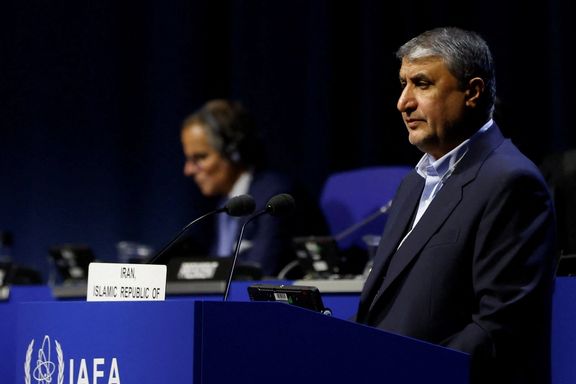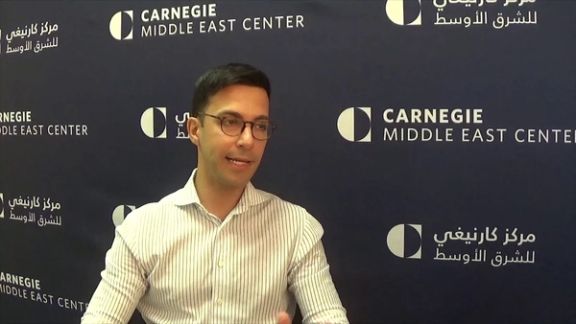Iran Promises ‘Firm Answer’ As Nuclear Rhetoric Sharpens

Elections in the United States and Israel have further dimmed prospects for reviving the 2015 Iran nuclear agreement, with some analysts now proclaiming it dead.

Elections in the United States and Israel have further dimmed prospects for reviving the 2015 Iran nuclear agreement, with some analysts now proclaiming it dead.
Mohammad Eslami, a vice-President and head of the Atomic Energy Agency of Iran, promised Saturday a “firm answer” to Thursday’s United States-sponsored resolution censuring Tehran at the governing board of the International Atomic Energy Agency. Speaking in Esfahan, Eslami evoked the “self-sacrifice” of the 23,000 “martyrs” from the province who died in the 1980-88 war with Iraq.
This was not the only talk this week of war. In a piece headlined ‘The Post Iran nuclear deal world won’t be pretty’ in the influential US magazine Foreign Policy, columnist Anchal Vohra suggested the US, or “the West,” could “even consider direct military intervention” to curb Iran’s nuclear program. Short of that, Vohra wrote, US might be “accelerating” supply to Israel of refueling tankers and other equipment that could assist an Israel strike on Iran.
Incoming Israeli prime minister Benjamin Netanyahu, whose government will include members of the Religious Zionism party, will inherit developed plans for attacking Iran, outgoing defense minister Benny Gantz said November 9. Recent reports have suggested the US is opposing the appointment of Religious Zionism leader Bezalel Smotrich to the defense portfolio.
Vohra’s Foreign Policy analysis, which drew on one published by Iran International in September, suggested that steps to pressure Iran, as military preparations were made, might include greater efforts on penalizing Chinese entities importing Iranian oil and petroleum products.
But in an informal survey of analysts, Vohra found little expectation that such steps would change Iran’s approach to the talks, which began April 2021, to revive the 2015 nuclear agreement, the JCPOA (Joint Comprehensive Plan of Action). Tehran has drawn ‘red lines’ that it shows no sign of erasing. These include ‘guarantees’ of economic measures to cushion Iran against the US later leaving a revised agreement, and insisting that the International Atomic Energy drop enquiries into uranium traces found in sites linked to Iran’s nuclear work before 2003.
JCPOA: dead or comatose?
The US argument that such ‘red lines’ go beyond the JCPOA left the analysts surveyed by Vohra divided as the whether the JCPOA was dead or comatose. “While in a deep coma…none of the parties wants to declare it dead, which would be an admission of foreign-policy failure,” said Mark Fitzpatrick, associate fellow at the International Institute for Strategic Studies. “It is hard to imagine that the deal could be restored,” said Ali Vaez, senior advisor at the International Crisis Group.

While President Joe Biden maintains his intention is to work diplomatically to revive the JCPOA – and that he is continuing ‘maximum pressure’ sanctions purely to that end – the Republican Party’s capture of the House of Representatives after the November 8 elections may well see growing Congressional opposition to the 2015 agreement, especially with so much focus on current protests in Iran and on Tehran’s supply of military drones used by Russia in Ukraine.
Vohra suggested that both the US and Iran may feel their leverage is growing. Iran’s President Ebrahim Raisi told the United Nations General Assembly in September that Tehran had neutralized ‘maximum pressure’ in many cases. Some Iranian analysts also argue that looming energy shortages due to curbs on Russian exports may incentivize European states to seek JCPOA revival as a way to lift sanctions on Iran’s crude oil.
‘Threat to Europe’
But the European signatories of the JCPOA – France, Germany, and the United Kingdom – as well as the European Union, which has chaired JCPOA revivals talks, are showing greater affinity with the US and a growing reluctance to deal diplomatically with a Tehran linked closer to Russia. Ursula von der Leyen, President of the European Commission, Friday played down the challenge over energy supplies while arguing that Iran’s “weapons proliferation” was a threat to Europe.
“It took us too long to understand a very simple fact that while we work to prevent Iran from developing nuclear weapons, we must also focus on other forms of weapons proliferation, from drones to ballistic missiles,” she said. “It is a security risk not just for the Middle East, but for us all.”